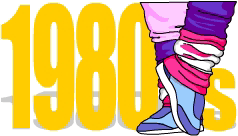Growing Up in the 1980s
Created | Updated Jun 23, 2008
Everyone was a lot younger in the '80s. Especially me.

Where were you between 1 January, 1980, and 31 December, 1989? Just starting school or starting a family? New Romancing or home computing? Were you fighting a war or were you simply a twinkle in your dad's eye?
More than just a collection of dates, the 1980s were a time of discovery, innovation, tragedy and creativity. It saw the end of the Cold War and the start of MTV, a rise in unemployment and the fall of the Berlin Wall; breakdancing and Reaganomics, political correctness, portable cassette-players, the Tiananmen Square massacre and 'Live Aid'. There were turned up collars, poufed up hair and a garage band in every neighbourhood. Neon was all the rage and Coca Cola came in both 'new' and 'classic' flavours.
But what was it like to live in the 1980s?
'We Don't Need No Education...'
Most of my memories from the '80s are 'idyllic childhood' sort of things, being as I was only seven by the end of the decade. I grew up in an era before extracurricular activities became mandatory for little kids, and spent most of my time outside, playing!
School was very different from today. At the beginning of the decade in England and Wales, 16-year olds either studied for O levels (ordinary level exams) or CSEs (Certificates of Secondary Education). But in 1987, O levels and CSEs were phased out and General Certificates of Secondary Education (or GCSEs) were brought in. GCSEs relied more on coursework rather than just an exam after two years, so were felt to be more representative of the pupil's work over the course rather than just cramming at the end of it.
In the 1970s, though pupils had fashions, they weren't lead quite as much by brand names. But with the explosion of 'must-have' brands - most notably in the region of trainers - the 1980s saw children under pressure from their peers to have the 'right' label. No longer could you get away with a pair of trainers bought from a supermarket. They had to be one of the leading brands such as Adidas or Nike (for more on '80s fashion, see below).
And of course, the BBC TV show Grange Hill was a major influence on school trends. Although it had started in the late 1970s, it really came to public attention after the storylines in the early 1980s about pupils protesting against school uniforms - successfully! Suddenly, a child in a small village in the North of England not only knew what it was like to go to an inner-city comprehensive school, but saw how children can make a difference and influence the thinking of adults. Having been criticised for perhaps giving a poor example to young viewers, Grange Hill set about creating a long-running storyline where Zammo, one of the show's most popular characters, became a drug addict. Tracing his gradual decline and, the following year, his recovery, the programme was praised for its responsible attitude towards the issue. The cast were invited to America to meet Nancy Reagan, the then-First Lady of the White House, and endorsed her 'Just Say No' anti-drugs campaign with a song of the same name.
The show changed the face of British children's programmes and still continues today, mixing drama with social issues and reflecting the changing face of British education.

